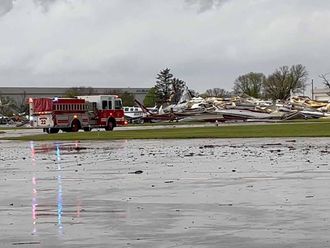Dudley, Massachusetts: When Dr Amjad Bahnassi, a psychiatrist who lives in the central Massachusetts city of Worcester, wants to visit his son’s grave, he braces for the drive to the Muslim burial ground in Enfield, Connecticut, about 100 kilometres away. It is the nearest cemetery devoted solely to Islamic burials — and, he said, it is filling up.
Bahnassi, chairman of the board of the Islamic Society of Greater Worcester, knew the area’s Muslims needed a closer place to bury their dead. The group thought it had found one in rural Dudley, about half an hour away: a patch of more than 20 hectares, past a sweetcorn stand and deep blue ponds, where there is unused farmland and wetlands hidden from the road by trees and tangled bushes.
But the organisation’s proposal to build a cemetery there became a lightning rod in this small town. It was denounced at meetings and ultimately turned down by the Zoning Board of Appeals, prompting charges of bigotry and drawing scrutiny from the US attorney for Massachusetts, who announced a civil rights investigation on August 18 into the town’s actions.
“I’ve been here since 1983,” Bahnassi, 56, a Syrian immigrant and an American citizen, said last week as he stood on the land. “I don’t deserve to die here?”
Officials insist that they have been unfairly portrayed as biased against the Muslims, and say the society did not have standing to seek a permit for the cemetery because of a provision giving the town the right of first refusal for the tract, which belongs to Annabelle Moninski, a private landowner.
“This is America,” Paul Joseph, a selectman, said at a meeting last Monday. “Anybody that wants to can make any accusation they want to, and that has happened consistently in this situation.”
As the number of American Muslims increases and immigrant Muslims age, groups have sought to construct their own cemeteries, which are often less expensive than other facilities and are familiar with Muslim traditions including quick burials, bodies facing Mecca and, when allowed locally, no coffins.
But from Minnesota to Texas — and even last week in Georgia — such proposals have been met with swells of opposition, similar to disputes over new mosques or schools, raising the spectre of exclusion even for the dead.
In Covington, Georgia, hundreds of people packed a public hearing last Monday on a proposed 135-acre development for a mosque and cemetery. According to the local NBC affiliate, residents expressed concerns about “bombings and beheadings” and how to “draw the line between innocent Muslims and radical Muslims.”
Other tense scenes played out in 2014 in Murfreesboro, Tennessee — although challenges to the cemetery there were rejected by a judge — and last summer in Farmersville, Texas, where a cemetery project is moving forward despite an angry meeting at which one woman pronounced, according to news reports, “People don’t trust Muslims.”
A report on religious discrimination published by the Justice Department in July cited concerns that worshippers “often face unlawful barriers in the zoning and building process.”
In January, a judge in Minnesota found that Castle Rock Township’s rejection of a proposed Muslim cemetery was “arbitrary and capricious.”
In July, the Justice Department filed suit against Bensalem Township, Pennsylvania, saying officials had violated the Religious Land Use and Institutionalised Persons Act, which bans discrimination against religious groups in zoning, when denying zoning approval for a proposed mosque. The same month, the department released a report on that law that said, “There is particularly severe discrimination faced by Muslims in land use.”
Carmen Ortiz, the US attorney here, is looking to see whether Dudley violated the same law by placing “unreasonable barriers to, and ultimately denying, their request for a conditional use permit to establish an Islamic cemetery in the town,” according to a statement.
After the Islamic Society applied for a permit in January, residents expressed concerns about traffic, noise and the effect that buried bodies could have on nearby wells or wetlands.
“You want a Muslim cemetery?” one resident said at a meeting in February, according to WBUR, a Boston public radio station. “Fine. Put it in your backyard. Not mine.”












